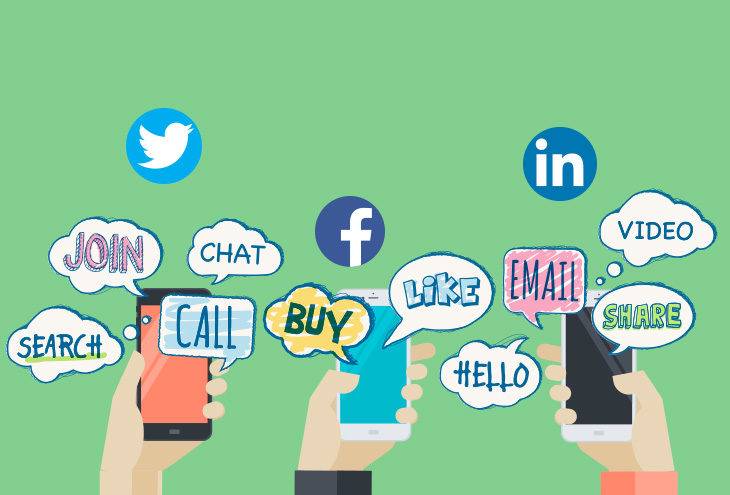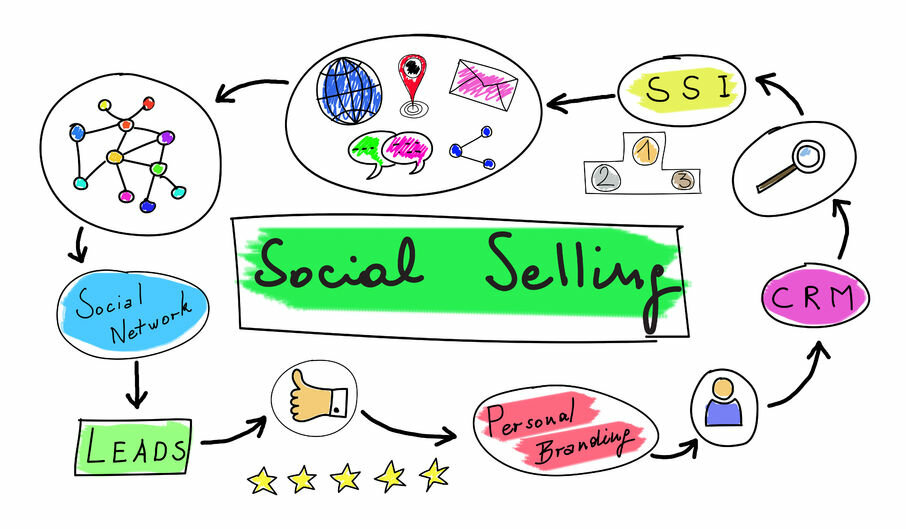Hello!
The Internet is rapidly bridging the gap between you and your target audience including your potential investors, users, employees, customers, and clients. Gone are the days when social media platforms were used as just a way to interact and engage.
Now social media plays a pivotal role in reaching out to them effectively and influence their entire decision-making journey, to build trustworthy relationships as well as to drive company revenue and sales profit.
Social Media as a sales tool
The power of social media lies in this one line mentioned in The Cluetrain Manifesto, "There are no secrets. The networked market knows more than companies do about their own products. And whether the news is good or bad, they tell everyone". Today, your customer can find out everything about your product and services, their defects and strengths from multiple sources without relying on just what your website says.
 The wide gamut of blogs, networks, and forums feed them constantly with real-time information about brands and their performances. Moreover, the immediacy of social media platforms gives you the chance to actively communicate with customers and prospects, monitor their social behaviors, track customer sentiments, listen to their conversations, analyze competitive differentiators, take prompt marketing decisions, prevent customer defections, and so on.
The wide gamut of blogs, networks, and forums feed them constantly with real-time information about brands and their performances. Moreover, the immediacy of social media platforms gives you the chance to actively communicate with customers and prospects, monitor their social behaviors, track customer sentiments, listen to their conversations, analyze competitive differentiators, take prompt marketing decisions, prevent customer defections, and so on.
In fact, the old stereotyped selling process is replaced by a personal consultative sales trend, which is driven by the generation that widely embraced social media as a highly influential device to shape business relationships.
Social media has turned the sales funnel upside-down and attracts a far wider spectrum of prospective customers in a fraction of time. The sales environment is transformed with the influx of social behavior which implies to – It's not who you know, it's what you know about who you know.
'Social Selling' is shaping things up!
 There are people around the world who are looking to buy products and satiate their specific needs within a given timeframe and budget. If only you could get your product or service in front of them in the desired way, they would buy at once from you.
There are people around the world who are looking to buy products and satiate their specific needs within a given timeframe and budget. If only you could get your product or service in front of them in the desired way, they would buy at once from you.
According to HubSpot, 74% of B2B buyers conduct more than half of their research online before making a purchase or contacting a salesperson.
So, in simple words, Social Selling is the process to leverage your social networks to reach, interact and engage with the right prospects while building trust and relationships to ultimately achieve sales targets. Social media as a selling platform is proving to be a tremendously effective way to generate better revenue streams and nurture leads.
 Social Selling is a collaborative effort where marketers/salespeople should focus primarily on building brand loyalty by delivering value to the customers in the form of knowledge that they seek to make a major purchase decision.
Social Selling is a collaborative effort where marketers/salespeople should focus primarily on building brand loyalty by delivering value to the customers in the form of knowledge that they seek to make a major purchase decision.
This spontaneous process of 'educating before selling' and 'diagnosing before pitching' builds a strong customer relationship based on trust. Social selling is more about people and technology where companies should adopt a 'Design Thinking' approach to reach, interact and convert their prospects and to retain the customers.
Measuring Social Selling ROI
Under ideal situations, the ultimate goal for using social selling is to increase sales revenue made out of social activities, customer engagement and social campaigns, which testify to its success. While endeavoring to measure ROI in social selling context, the first step is to recognize and understand the company's business and marketing goals.
 Next, you need to ensure that you are spending the money and effort for the right reason, which is to build and nurture relationships with your target market in order to provide long-term support to the sales and marketing activities to drive overall profit.
Next, you need to ensure that you are spending the money and effort for the right reason, which is to build and nurture relationships with your target market in order to provide long-term support to the sales and marketing activities to drive overall profit.
Apart from direct tangible returns in the form of an increase in sales and company profit, social selling ROI can also be defined by metrics like total number of (newsletter, eBooks, case study etc.) downloads, contact acquisitions, new and repeat visitors to your website, the number of content subscriptions and sign-ups, which need a little more nurturing before final conversion. This gives insights about how strongly your customers feel for, connect with and explore your brand.
 Returns from social selling are highly determined by the capability to convey a brand's expertise and knowledge in a given field by establishing an impressive and spontaneous conversation with the target audience.
Returns from social selling are highly determined by the capability to convey a brand's expertise and knowledge in a given field by establishing an impressive and spontaneous conversation with the target audience.
The aim of this conversation is more than to just inform about the product/service. It is also to educate, entertain and enlighten the customers while adding value to their entire social engagement experience.
However, it will be impractical to think that social selling can lead to the immediate explosion of leads in the pipeline; rather it involves strategic social media activities and involvement spanning consistent hard work to reach out and connect with customers through multiple communication platforms to build valuable relationships.
The right way of using Social Selling
Social selling implies discovering sales opportunities through the power of social media. It is one of the most powerful strategies to help sell your ideas, establish brand credibility, develop customer trust and build relationships through social media platforms where your customers spend most of their time while selecting a specific product, service or business.
According to LinkedIn Sales Solutions, 92% of B2B buyers interact with salespeople and marketers if they are considered as an industry thought leaders. This means, to establish oneself as a trusted source, a marketer must demonstrate in-depth knowledge and share insightful opinions in a distinguishable way.
● Do the basic research
 The groundwork of every good relationship starts with understanding. Hence, ensure to study and understand your target customers, users, investors and clients and gain as much information as possible about their interests, viewpoints, lifestyles, opinions, professions, habits, behavioral responses and so on. Nevertheless, social media networks and platforms will offer maximum assistance in this regard.
The groundwork of every good relationship starts with understanding. Hence, ensure to study and understand your target customers, users, investors and clients and gain as much information as possible about their interests, viewpoints, lifestyles, opinions, professions, habits, behavioral responses and so on. Nevertheless, social media networks and platforms will offer maximum assistance in this regard.
● Build strong profiles
Take your company's social media profiles rather seriously as they are generally displayed at the top of the SERPs. Based on familiarity and preference, visitors tend to open social profiles to check the level of popularity and acceptance. Twitter, LinkedIn and Facebook profiles of a company make a lot of difference in building the first impression of the company or the brand. Keeping this in mind, incorporate links to your website with a neat and catchy CTA button.
● Be sincere and spontaneous
 Take time and build a strategy to engage the audience effectively by establishing a connection. Starting a random dialogue based on their interests wouldn't be bad as long as it sounds spontaneous and sincere. Building a strong network of friends with like-minded audiences becomes easier when done with authenticity. Using humor, wit, compassion and similar positive emotions give a boost in picking up a common thread of discussion and conversation.
Take time and build a strategy to engage the audience effectively by establishing a connection. Starting a random dialogue based on their interests wouldn't be bad as long as it sounds spontaneous and sincere. Building a strong network of friends with like-minded audiences becomes easier when done with authenticity. Using humor, wit, compassion and similar positive emotions give a boost in picking up a common thread of discussion and conversation.
● Develop effective landing pages
Favorable social media profiles set an example of a perfect introduction of your landing page, but the actual matter and content provided on your landing page make the ultimate difference. For companies involved in direct selling through websites, it is imperative to understand that customers don't prefer clicking through multiple webpages and are inclined towards quick and easy sales with short and simple checkout processes. Also, landing pages with buying carts and multiple payment options witness higher conversion rates.
● Use social selling tools
 Efficient and relevant social selling tools like LinkedIn Sales Navigator, Nimble, rFactr, Awario, Sproutsocial, and Hootsuite (www.hootsuite.com/platform) add efficiency to the sales team and increase ROI over time while minimizing delays and complexities in sales processes.
Efficient and relevant social selling tools like LinkedIn Sales Navigator, Nimble, rFactr, Awario, Sproutsocial, and Hootsuite (www.hootsuite.com/platform) add efficiency to the sales team and increase ROI over time while minimizing delays and complexities in sales processes.
These tools come with specific problem-solving, engagement, conversation and social listening capabilities and features that smoothen the purchasing process for pleasant customer experience. It makes the entire process of buying quick and easy with minimum hiccups and complications.
● Learn about PPC advertising
Learn about the power of PPC advertising as from a sales standpoint, it maximizes every penny you spend. For instance, Facebook offers relevant impressions and limitless options to customize the advertisements based on geographical region, behavior, personal interests, age, gender, occupation, income, and spending habits.
● Nurture relationships
 After taking care of all the technical functionalities of your social profiles and landing pages, the most important aspect would be to nurture and deepen the relationships with your customers to retain brand credibility and to build a lasting impression.
After taking care of all the technical functionalities of your social profiles and landing pages, the most important aspect would be to nurture and deepen the relationships with your customers to retain brand credibility and to build a lasting impression.
After all, social selling is mostly about forging relationships by offering excellent customer experience and generating value.
The Ultimate Business Benefits of Social Selling
Shortened sales cycle: A growing number of respondents is gathering product/service information from direct/indirect social media sources. Social selling can help them make easy and quick purchase decisions based on relevance, recommendations, and interactions.
Reputation management: Social selling can enhance the online reputation, image and credibility of a brand as 80-95% of buyers' decisions are shaped by online reviews. Well-planned and optimized social profiles for brands speak for themselves.
 Lead generation: Marketers use social selling for establishing a brand's social presence through effective profiles. It drives lead generation as they monitor, listen and engage in social conversations around products and services.
Lead generation: Marketers use social selling for establishing a brand's social presence through effective profiles. It drives lead generation as they monitor, listen and engage in social conversations around products and services.
Generate new revenue streams: Marketers get an inside look at the performance of a specific product/service through social selling, which unveils advanced and more effective ways to generate revenue, drive conversion and influence business process.
Build brand loyalty: Results-driven social selling does more than just increase company profits through revenue/lead generation. It connects with the customers, retains them and builds lasting relationships with them while creating brand loyalty.
Also read:
- How to Choose the Right VoIP Provide
- Most Innovative Technologies Implemented Into The Gaming Industry In 2025
- Are You Cut Out to Own a Company?
Final Thoughts on Social Selling as a Tool to Create Business Outcomes
 Today's marketing professionals know the value of social listening and the brilliant outcomes it can produce. They take part in meaningful discussions and conversations and observe the social behavior of the target audience that offers the right insights about their buying habits. Modern marketers use this information to offer 'just the right thing' they want at that very moment, which aims to increase brand recognition and enhance the customer experience with the brand.
Today's marketing professionals know the value of social listening and the brilliant outcomes it can produce. They take part in meaningful discussions and conversations and observe the social behavior of the target audience that offers the right insights about their buying habits. Modern marketers use this information to offer 'just the right thing' they want at that very moment, which aims to increase brand recognition and enhance the customer experience with the brand.
Social selling can incredibly propel business intelligence that can guide decision-makers to take actions based on real-time insights on clients, customers, competitors, prospects and influencers.
To put it all together, social selling goes beyond making tangible sales and marketing profit; it defines a company's image and reputation that goes a long way in creating and strengthening brand perception and customer relationship, which forms the backbone of brand loyalty and trust, and ultimately drives profitability and revenue in the long run.
Companies looking to leverage social selling need to involve a well-laid Social Listening and engagement strategy to improve their brand's social presence. They can also conduct Sentiment Monitoring and Response exercises to connect better with their customers while studying their social behavior, online activities, and interest areas.
Thank you!
Subscribe to our newsletter! Join us on social networks!
See you!






